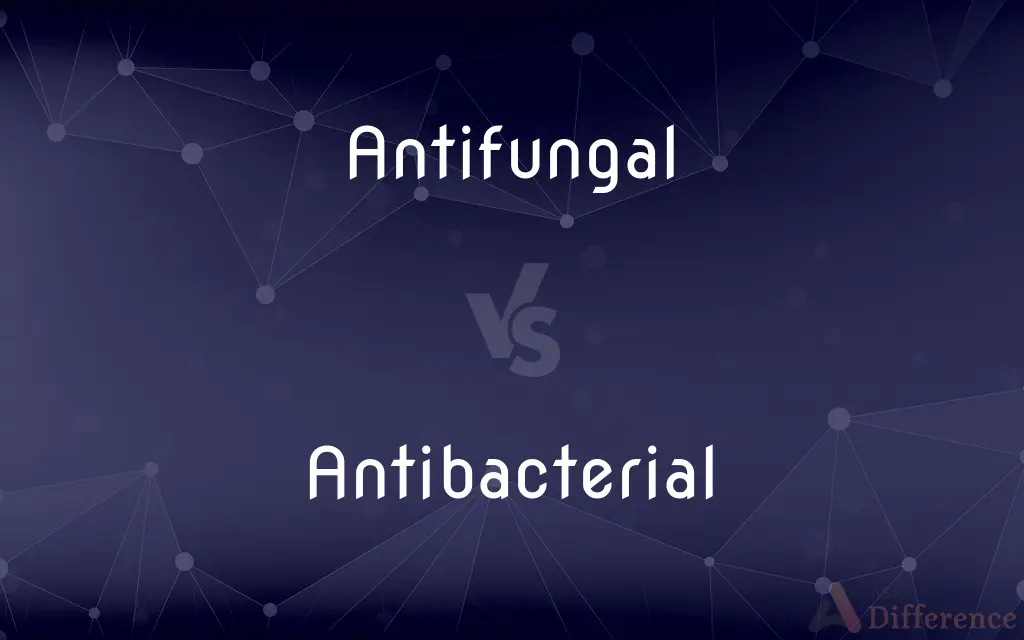Antifungal vs. Antibacterial — What's the Difference?
By Maham Liaqat & Urooj Arif — Updated on March 18, 2024
Antifungal agents target fungi, treating infections like athlete's foot or thrush, while antibacterial agents combat bacteria, addressing conditions like strep throat or urinary tract infections.

Difference Between Antifungal and Antibacterial
Table of Contents
ADVERTISEMENT
Key Differences
Antifungal medications are designed to eliminate or inhibit the growth of fungi, which can cause a range of infections in the body, including on the skin, nails, and in mucous membranes. These infections might manifest as ringworm, athlete's foot, or yeast infections. Antibacterial agents, on the other hand, are used to fight bacterial infections, which can range from mild conditions like acne to more severe diseases such as pneumonia or tuberculosis.
Antifungals work by disrupting the cell walls of fungi, preventing their growth and reproduction. Common forms include creams, ointments, oral tablets, and injections. Antibacterials function by targeting various aspects of bacterial cells, such as cell wall synthesis, protein synthesis, or DNA replication, leading to the bacteria's death or inhibition of growth. They come in various forms, including topical creams, oral antibiotics, and intravenous medications.
The distinction between antifungals and antibacterials is crucial because it underscores the importance of accurate diagnosis in treating infections. Using an antibacterial for a fungal infection, or vice versa, can be ineffective and may lead to resistance, side effects, or prolonged illness.
While both types of medications are vital in treating infections, the rise of antimicrobial resistance has become a significant concern. This has led to calls for prudent use of these agents, emphasizing the need for proper medical guidance in their administration to ensure they remain effective tools in combating infectious diseases.
Antifungals and antibacterials serve different purposes in the medical field, targeting specific types of pathogens. Their correct use is essential for effective treatment and the prevention of resistance, highlighting the importance of distinguishing between fungal and bacterial infections for appropriate medical intervention.
ADVERTISEMENT
Comparison Chart
Targets
Fungi
Bacteria
Common Uses
Athlete's foot, thrush, ringworm
Strep throat, urinary tract infections, pneumonia
Mechanism of Action
Disrupts fungal cell walls
Inhibits cell wall synthesis, protein synthesis, or DNA replication in bacteria
Forms
Creams, ointments, tablets, injections
Creams, oral antibiotics, injections
Importance
Essential for treating fungal infections
Crucial for managing bacterial diseases
Resistance Concerns
Present, though less common than with antibacterials
Significant concern, leading to superbugs and treatment challenges
Compare with Definitions
Antifungal
Used to treat a variety of fungal infections in different parts of the body.
Oral antifungal medications can treat systemic infections like histoplasmosis.
Antibacterial
Effective against a wide range of bacteria, including both Gram-positive and Gram-negative types.
Broad-spectrum antibiotics can treat infections when the specific bacteria are unknown.
Antifungal
Medications that specifically target and eliminate fungal pathogens.
For athlete's foot, an antifungal cream is often prescribed.
Antibacterial
Mechanisms include disrupting cell walls, protein synthesis, and DNA replication.
Penicillin, an antibacterial, works by inhibiting bacterial cell wall synthesis.
Antifungal
Works by disrupting the cell structure or reproductive processes of fungi.
Some antifungals inhibit the synthesis of ergosterol, a key component of fungal cell membranes.
Antibacterial
Resistance is a significant issue, requiring careful prescription and use.
Misuse of antibacterials has led to the emergence of MRSA and other resistant bacteria.
Antifungal
Available in various formulations depending on the infection site.
Antifungal shampoos are used for fungal infections of the scalp.
Antibacterial
Essential for treating serious bacterial diseases and preventing surgical infections.
Antibacterials are crucial in preventing infections during and after surgery.
Antifungal
Can lead to resistance if overused or misused.
Overuse of antifungals in agriculture can contribute to resistance, affecting human health.
Antibacterial
Agents designed to fight bacterial infections by targeting specific bacterial functions.
Antibacterial creams can prevent wound infections.
Antifungal
An antifungal medication, also known as an antimycotic medication, is a pharmaceutical fungicide or fungistatic used to treat and prevent mycosis such as athlete's foot, ringworm, candidiasis (thrush), serious systemic infections such as cryptococcal meningitis, and others. Such drugs are usually obtained by a doctor's prescription, but a few are available over the counter (OTC).
Antibacterial
Destroying or inhibiting the growth of bacteria.
Antifungal
Destroying or inhibiting the growth of fungi.
Antibacterial
An antibacterial substance.
Antifungal
An antifungal drug.
Antibacterial
(pharmaceutical effect) Killing or inhibiting bacteria.
This drug has an antibacterial effect.
Antifungal
(pharmaceutical effect) That inhibits the growth of fungi; antimycotic.
Antibacterial
(archaic) Opposing the theory that diseases are caused by bacteria.
Antifungal
(pharmaceutical drug) A drug that inhibits the growth of fungi.
Antibacterial
(pharmaceutical drug) A drug having the effect of killing or inhibiting bacteria.
Many household products contain antibacterials.
Antifungal
Any agent that destroys or prevents the growth of fungi
Antibacterial
Killing or inhibiting the growth of bacteria; - applied also to serum for protection against bacterial diseases.
Antifungal
Capable of destroying fungi
Antibacterial
A chemical substance which kills or inhibits the growth of bacteria.
Antibacterial
Any drug that destroys bacteria or inhibits their growth
Antibacterial
Destroying bacteria or inhibiting their growth
Common Curiosities
What is antimicrobial resistance, and why is it a concern for antibacterials and antifungals?
Antimicrobial resistance occurs when microorganisms evolve to withstand the effects of medications, making standard treatments ineffective and leading to persistent infections.
Are there medications that are both antifungal and antibacterial?
Some medications have properties that can act against both fungi and bacteria, but they are not as common, and their use is generally targeted based on the specific infection type.
Can you use an antibacterial for a fungal infection?
No, antibacterials are ineffective against fungal infections, as they specifically target bacteria, not fungi.
How can you prevent the development of resistance to antifungals and antibacterials?
Preventing resistance involves using these medications only when necessary, following prescribed courses fully, and promoting the development of new treatments.
What role do antifungals and antibacterials play in public health?
They are crucial in controlling infectious diseases, preventing the spread of infections in healthcare settings, and treating conditions that could otherwise lead to serious health complications or outbreaks.
Why is it important to differentiate between fungal and bacterial infections?
Differentiating between the two is crucial for effective treatment, as using the wrong type of medication can lead to ineffective treatment and contribute to resistance.
Can antifungals and antibacterials be used together?
They can be used together in cases where both fungal and bacterial infections are present, but this should be done under medical supervision to ensure safety and effectiveness.
How are new antifungal and antibacterial agents developed?
New agents are developed through pharmaceutical research, which involves screening for active compounds, testing for efficacy and safety, and conducting clinical trials to ensure they are effective against targeted pathogens without causing significant harm to patients.
How do doctors determine whether an infection is fungal or bacterial?
Doctors can determine the type of infection through physical examination, symptoms, medical history, and sometimes laboratory tests to identify the specific pathogen.
Are there natural antifungal and antibacterial agents?
Yes, some natural substances have antifungal or antibacterial properties, but their efficacy, safety, and dosage need careful consideration and research.
Share Your Discovery

Previous Comparison
Ascend vs. Transcend
Next Comparison
Frill vs. RuffleAuthor Spotlight
Written by
Maham LiaqatCo-written by
Urooj ArifUrooj is a skilled content writer at Ask Difference, known for her exceptional ability to simplify complex topics into engaging and informative content. With a passion for research and a flair for clear, concise writing, she consistently delivers articles that resonate with our diverse audience.















































